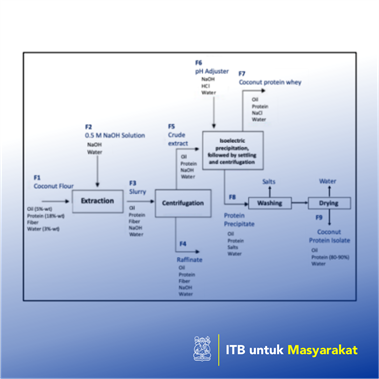

Dianika Lestari
As the largest archipelago country, Indonesia has the largest coconut (Cocos nucifera) plantation in the world of approx. 3,745,000 ha which is a smallholder plantation and is the source of income for two and a half million farmer families. The coconut plantation in Indonesia constitutes 31.2% of the total world coconut area. Coconut has a pulp which has high potential to be developed as a food raw material with high economic value. Coconut meat can be directly consumed or processed into coconut milk, coconut flour (desiccated coconut), and cooking oil. Coconut oil can be obtained from dried or fresh coconut flour using Soxhlet extraction method with organic solvents. Defatted coconut meat will have higher protein content approx. 19-20%-wt [8]. Coconut flour is coconut meat that is dried, milled, and processed under hygienic conditions for human consumption [6]. The high content of undigestible carbohydrate can inhibit protein digestibility, therefore, protein was extracted and isolated from coconut flour to improve its digestibility for better utilization. Protein extraction was carried out at alkaline conditions far from its isoelectric point, to increase protein solubility. Protein was precipitated from crude extract at coconut protein isoelectric pH of about 4 [11].
Penerapan Karya Tulis
This study aimed to investigate the effect of solvent ratios and oil content of ingredients on extractability of protein and recovery of protein isolates from full-fat and defatted coconut flour. The high content of undigestible carbohydrate in coconut flour can inhibit protein digestibility, therefore, protein extraction from coconut flour can improve its digestibility for better utilization to fulfil the increased of protein demand and other nutrients and will give benefit impact on food security in Indonesia.